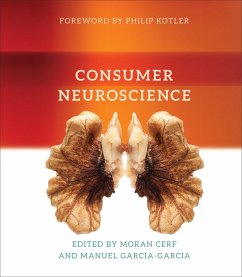A comprehensive introduction to using the tools and techniques of neuroscience to understand how consumers make decisions about purchasing goods and services.
Contrary to the assumptions of economists, consumers are not always rational actors who make decisions in their own best interests. The new field of behavioral economics draws on the insights of psychology to study non-rational decision making. The newer field of consumer neuroscience draws on the findings, tools, and techniques of neuroscience to understand how consumers make judgments and decisions. This book is the first comprehensive treatment of consumer neuroscience, suitable for classroom use or as a reference for business and marketing practitioners.
After an overview of the field, the text offers the background on the brain and physiological systems necessary for understanding how they work in the context of decision making and reviews the sensory and perceptual mechanisms that govern our perception and experience. Chapters by experts in the field investigate tools for studying the brain, including fMRI, EEG, eye-tracking, and biometrics, and their possible use in marketing. The book examines the relation of attention, memory, and emotion to consumer behavior; cognitive factors in decision making; and the brain's reward system. It describes how consumers develop implicit associations with a brand, perceptions of pricing, and how consumer neuroscience can encourage healthy behaviors. Finally, the book considers ethical issues raised by the application of neuroscience tools to marketing.
Contributors
Fabio Babiloni, Davide Baldo, David Brandt, Moran Cerf, Yuping Chen, Patrizia Cherubino, Kimberly Rose Clark, Maria Cordero-Merecuana, William A. Cunningham, Manuel Garcia-Garcia, Ming Hsu, Ana Iorga, Philip Kotler, Carl Marci, Hans Melo, Kai-Markus Müller, Brendan Murray, Ingrid L. C. Nieuwenhuis, Graham Page, Hirak Parikh, Dante M. Pirouz, Martin Reimann, Neal J. Roese, IritShapira-Lichter, Daniela Somarriba, Julia Trabulsi, Arianna Trettel, Giovanni Vecchiato, Thalia Vrantsidis, Sarah Walker
Hinweis: Dieser Artikel kann nur an eine deutsche Lieferadresse ausgeliefert werden.
Contrary to the assumptions of economists, consumers are not always rational actors who make decisions in their own best interests. The new field of behavioral economics draws on the insights of psychology to study non-rational decision making. The newer field of consumer neuroscience draws on the findings, tools, and techniques of neuroscience to understand how consumers make judgments and decisions. This book is the first comprehensive treatment of consumer neuroscience, suitable for classroom use or as a reference for business and marketing practitioners.
After an overview of the field, the text offers the background on the brain and physiological systems necessary for understanding how they work in the context of decision making and reviews the sensory and perceptual mechanisms that govern our perception and experience. Chapters by experts in the field investigate tools for studying the brain, including fMRI, EEG, eye-tracking, and biometrics, and their possible use in marketing. The book examines the relation of attention, memory, and emotion to consumer behavior; cognitive factors in decision making; and the brain's reward system. It describes how consumers develop implicit associations with a brand, perceptions of pricing, and how consumer neuroscience can encourage healthy behaviors. Finally, the book considers ethical issues raised by the application of neuroscience tools to marketing.
Contributors
Fabio Babiloni, Davide Baldo, David Brandt, Moran Cerf, Yuping Chen, Patrizia Cherubino, Kimberly Rose Clark, Maria Cordero-Merecuana, William A. Cunningham, Manuel Garcia-Garcia, Ming Hsu, Ana Iorga, Philip Kotler, Carl Marci, Hans Melo, Kai-Markus Müller, Brendan Murray, Ingrid L. C. Nieuwenhuis, Graham Page, Hirak Parikh, Dante M. Pirouz, Martin Reimann, Neal J. Roese, IritShapira-Lichter, Daniela Somarriba, Julia Trabulsi, Arianna Trettel, Giovanni Vecchiato, Thalia Vrantsidis, Sarah Walker
Hinweis: Dieser Artikel kann nur an eine deutsche Lieferadresse ausgeliefert werden.

